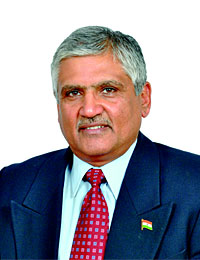Publisher's Note
 Sport is the biggest teacher of it all! The first lessons in one’s life generally come from sports in the form of games and activities in one’s childhood. The learning continues with our growth and I can say with confidence that some of our best lessons in life come from having played some sport or the other. The lubrication world is no stranger to learning from games and sports. There have been numerous equipment and reliability management lessons from sporting events, be it Cricket, Football, Chess or Badminton. 4 billion people across the country suffered heartbreak in Nov 2023 as India fell short of winning the ODI World Cup after a terrific campaign. For 40 nights since their first win against Australia in Chennai, India strode like the invincible, but would stumble on the 41st night to a tame defeat.
Sport is the biggest teacher of it all! The first lessons in one’s life generally come from sports in the form of games and activities in one’s childhood. The learning continues with our growth and I can say with confidence that some of our best lessons in life come from having played some sport or the other. The lubrication world is no stranger to learning from games and sports. There have been numerous equipment and reliability management lessons from sporting events, be it Cricket, Football, Chess or Badminton. 4 billion people across the country suffered heartbreak in Nov 2023 as India fell short of winning the ODI World Cup after a terrific campaign. For 40 nights since their first win against Australia in Chennai, India strode like the invincible, but would stumble on the 41st night to a tame defeat.
The ODI World Cup match between India and Australia had its fair share of twists and turns, showcasing the importance of adaptability, grit, and strategic thinking. Failure is productive when it occurs in a new, unexplored area that produces valuable knowledge. When failure is chronic, controllable, known to management and significant in its impact, such as with lubrication-induced equipment failures, it is embarrassing and irresponsible.
Likewise, knowing when a piece of equipment is going to fail (predictive maintenance) is much more difficult than making it last long (proactive maintenance). Even more complex is root cause analysis (RCA) which is performed postmortem, like an autopsy. Still, reliability professionals are increasingly stressing the importance of performing RCAs following all failures of critical machinery. As odd as it sounds, it is more productive to study failures than successes. Many have said that RCA is more art than science. Indeed, it seems to draw from a range of skills, talents, experience and knowledge. Some investigators seem to have a special knack for it while others toil through the process. But even if an RCA is unsuccessful at uncovering the root cause, the process usually brings forth new knowledge and greater awareness of reliability risk factors to the team. Similarly, lubricant users should understand the essence of world-class lubrication. They should define a clear pathway to excellence and best practice. After all, much has changed in the lubrication field over the past two decades, yet too often, the activities of lubrication have remained unchanged from more than half a century ago. As today’s industries face harsh competition and razor-thin operating margins, there is real need to challenge conventional wisdom regarding how machines are lubricated.
Specific skills and tasks may vary significantly from company to company, but it will typically include measuring performance of critical assets, identifying root causes for failures, managing related data, and implementing maintenance tasks to improve reliability.
Maintenance technology is advancing at a breathtaking pace. This cover story takes a detailed look into how connected worker technology offers organizations of all sizes a real opportunity to minimize capital spend and operating costs while improving equipment availability, safety, and asset longevity. Some other topics covered in this edition includes: The era of mobile dominance, ChatGPT in lubrication, maintenance and reliability root-cause analysis explained, a comprehensive exploration of tribology unveiling the historical evolution, managing turbine oils in a sustainable way, what am I looking at: 3 questions in oil analysis, enhancing equipment performance: the role of oil analysis and particle counting, We look forward to your support and feedback to enable us to improve the content and layout of Machinery Lubrication India.
We welcome readers to participate by sending their feedback & contributing articles. We’d like to hear from you about case studies or new products in the field of lubrication, especially methods and/or products that have been successful. We look forward to the continued patronage of the advertisers and the subscribers.
Warm regards,
Udey Dhir
